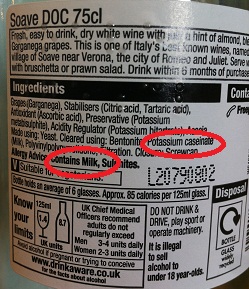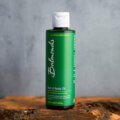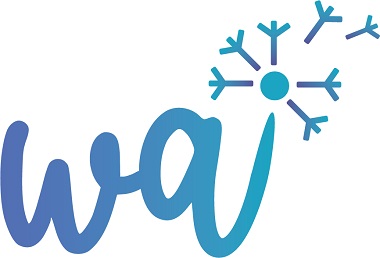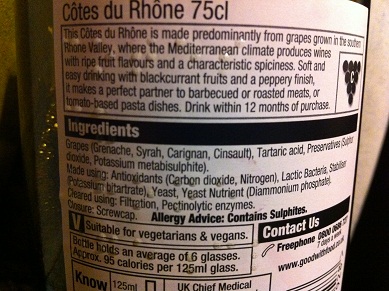You might think wine containing milk is a crazy idea. Milk and wine don’t mix! No they do not… but recently I discovered, after sharing a bottle of white wine from The Co-op, that this wine did indeed have a warning label declaring quite clearly that it contained MILK.
The ingredient used was potassium caseinate (from milk), which according to wine manufactures is processed and so will not contain any of the allergen from the milk.
Most wine has the ‘Contains sulphites’ warning but so far I’ve only found The Co-op labels wine with every ingredient. Top marks to Co-op. I hope other supermarkets and wine manufacturers take note.
Potassium caseinate is made my disolving casein which is a white powder from milk in potassium and then it’s hydrolyzed. This forms a clear tastless liquid which is used to ‘clear/fine’ the wine. The potassium caseinate binds to the particles in the wine which might cause cloudiness and these can them be removed – leaving lovely clear white wine.
Well that’s kind of what happens without getting to scientific, but how do they know it no longer causes an allergic reaction? Is any left in the wine?
Have wine manufacturers or scientists really tested this? Does it depend how much potassium caseinate is used? How much do they use?
I found this blog from the academic wino entitled “Casein Levels in Commercial Wines Not Enough to Elicit Allergic Reaction in Milk Allergy-Stricken Adults”, which discusses the findings of a study in Italy to compare levels of casein in wine. The findings suggest that those with a dairy allergy should not worry about potassium caseinate in wine since the levels are minuscule.
So what happened?
Nothing bad seemed to happen though I did stop drinking the wine and didn’t finish my glass. I didn’t have any swelling in my throat or lips. I wasn’t wheezing. My skin looked OK. No hives or rashes appearing.
I took an anti-histamine and tried to forget about it, hoping I would not wake up covered in rashes, which can be the case if I eat certain allergens. Usually dairy gives me a very quick and nasty reaction though so perhaps I had got away with it.

Next morning all was well. Nothing untoward had happened in the night and I felt fine.
The next day. Still fine. Nothing major to report.
Certainly nothing to indicate I’d consumed the dreaded milk.
The only thing noticable were a few hives on the backs of my legs, which could have been caused by anything.
Also some hard lumps on the back of my neck, behind my ears and in my hairline.
I often get these. They are not quite hives but harder and more permenent. They stay for quite some time, itch like mad, and if I do scratch them accidentally they form scabs and bleed quite profusedly.
So far I have not scratched them but they are still there.
I have often wondered what causes these little lumps so maybe it’s potassium caseinate.
So, not totally conclusive proof but certainly I suffered no massive reaction to this wine. Has anyone had a reaction to milk in wine? Or could the reactions I do have be due to some other chemical added for reasons only know to wine manufacturers? Most people don’t realise that what they are drinking isn’t just grapes so hopefully wine manufacturers will soon have to comply to the same labelling rules as the rest of the food industry.












Hi Ruth, Just wanted to add my experience of milk in wine here. Chris my some is severely allergic to cow’s milk and a few years ago we bought some champagne to celebrate his 18th birthday. Unfortunately as soon as he had a mouthful he started to feel unwell. He didn’t have anaphylaxis but did feel quite unwell for several hours. At that time labelling in Europe was non existent for wines and we weren’t entirely sure what had caused the problem. However whilst Chris was travelling on his gap year travels in Australia his friends bought some champagne and in Australia the milk content was clearly labelled.
In January 2010 new EU law came into effect which means that all wines across EU countries must include all the 14 major allergens if included in any alcoholic drinks. This list includes milk, egg and fish products which are all often used in drinks to clarify them and sulphites which are used as a preservative
Hi Sue, Oh that’s awful. Your poor son. I’ve always thought Champagne was free from allergens – how wrong I was. Yes they should be labelling wine but very few are. The wine companies are appealing against having to do this, which is ridiculous. I had a response from the Food Standards Agency about this. Will dig it out and share here.
Response from the Food Standards Agency to my enquiry about why people were still not labelling wine properly.
As you may be aware, food allergen labelling legislation requires that where specified allergenic foods or their derivatives are used as ingredients in pre-packed foods -whatever the level of inclusion, – the relevant allergenic food has to be clearly indicated on the labelling. The legislation established a list of 14 foods: cereals containing gluten (wheat, rye, barley, oats), crustaceans, eggs, fish, molluscs, peanuts, nuts (such as almonds, hazelnuts, walnuts, cashews, pistachios, brazil nuts), lupin, soybeans, milk, celery, mustard, sesame, and sulphur dioxide at levels above 10mg/kg or 10 mg/litre expressed as SO2. So if milk or milk derived ingredients are used in food or drinks, then these ingredients must be clearly indicated on the label. Usually, they are mentioned in the ingredients list but in the case of products that do not have an ingredients list such as wine, this is by use of a “Contains X” statement. It must be clear to the consumer that the ingredient is “milk derived.”
Milk is not usually used as an ingredient in wine, though it may be added to some beers. It is more usually used as a fining agent. The European Commission published Directive 2007/68/EC which lays down exemptions from the allergen legislation. At present, milk derived fining agents are exempt, so they do not need to be named on labelling until 30th June 2012, but this situation is under review. Although milk-derived fining agents need not be named on wine labels, some manufacturers may choose to mention milk on the labelling, but others may not, since it is not a legal requirement.
The usual milk fining agent is casein, (a protein) which tends to be used in white wine rather than red. But fining agents are used to remove protein residues in wine, and are usually then filtered out or other methods are used to remove the precipitate, so the residues of casein would be very low.
With regard to the issue of “dairy free” wines, there is no legal definition of the term “dairy free” but current labelling legislation does not allow the use of false and misleading terms in general on food labels, so foods described as “dairy free” would not be expected to contain milk ingredients. You might wish to contact the Department for Environment, Food and Rural Affairs (DEFRA), which would be able to give further advice on legislation about wine making. You can call them on their helpline – 08459 33 55 77 – or email them on defra.helpline@defra.gsi.gov.uk.
I hope this information is helpful for you.
Yours sincerely
Geraldine Newcomen (Mrs)
Food Allergy Branch
Lets asses this for a while, milk is considered an amazing thing (hence the huge industry), yet , it is a baby food by natures terms. Fish ,eggs and nuts all contain very different forms of protein than grass/flora eating animals. I can eat dark red tuna, but have had anaphylactic shock ,when i ate light meat tuna, this is also the case with canned varieties . There was a theory that, the canning process changed the make up of the protiens, but this is obviously not the case for me. Sulphites are a form of culture, many salamis use sulphites , as do many bacon’s and ham’s , when i drink wine with sulphites they give me a racing heart beat, and when i drink wine with fish/egg or milk fining i may or may not get an anaphylactic shock ,, but for sure ;i get itchy, my head gets hot, i have a rash for days, get lethargic ,any type of healing my body is trying to do goes on hold and the worst thing is , the world does not seem to be interested in helping by encouraging, the industrialization of milk,fish,nut and egg products, yet where are all the clean foods like , vegetables and good flora fed meat ? purple potatoes and yellow tomatoes .
Is there anything you’re NOT allergic to? Bad DNA…
Hey Nelly, I nearly didn’t approve this comment but it really made me laugh actually so thanks for the Monday humour. You could say bad DNA but noone else in my family has allergies like these, so I suspect that for whatever reason I’m sensitive, and I also think the rise in allergies in this country is due to the way we live, the things we eat, the chemicals and pollutants you cannot get away from etc. etc.
I think I’d rather have the allergies which have made me really look at what I eat and how I live my life. As a result I am much healthier than I would have been because I have to look after myself etc. Do you have any allergies? or do you just have superior DNA as you so eloquently put it?
I have had some awful nights from drinking wine (one or two glasses) when I’ve had dairy that day. I don’t normally have bad reactions if I have small amounts of dairy. I have come to the conclusion that some wines must contain more casein than others and that’s why I have bad reactions but not every time. I have had horrendous stomach cramps this evening. I think perhaps its time to go back to vodka or cider :/
I agree, some wines must contain quite high levels… Hopefully soon they will have to start telling us!
I know it is veeery long since you wrote this comment that i just saw. Have you checked up Alpha-gal allergy?
I know of it, a very peculiar tic that causes an allergy to meat. I should write a blog about this, it’s fascinating and complex and confounding. Thanks for the idea and I hope you’re well.
I’ll be really happy when they start labelling wines properly and stop with this bunkum about it being too small an amount to cause a reaction. Who are they to judge? I spent years being ill once or twice a week until they started labelling foods properly and I gave up alcohol for a while as I didn’t understand what was making me so ill. Once I discovered there was milk in wine, I discovered I could happily drink tequila. Now I drink vegan wines. Happily they also don’t make me ill after half a glass. Its unbelievably nice to drink a glass of wine without getting ill, now I understand what the fuss is about. Sainsbury’s also does a vegan Cava for under a tenner. At some point soon I’m going to experiment with vegan beer.
I know it’s frustrating that they can get away with it. I played Russian roulette last night so today just call me mrs tomato face. Lovely
How wonderful that once again the rest of the world is FAR ahead of the USA in labeling toxic or allergenic things in food and drink. Sitting here this morning with a headache, queasy stomach after a horrible night’s sleep, I now know that the 2 glasses of white wine i had last night were very likely fined with casein—of which I recently figured out is why my Celiac symptoms have not cleared in 8 years. The last winery I called to figure out ingredients REFUSED to tell me, saying their ingredients are proprietary! I have found 2 expensive hard-to-get vegan, organic wines that I can drink without feeling ill. I’d rather go without my daily wine and support honest vintners than get sick from unlabeled milk-wine. I sure wish the USA would force the labeling of wines and other beverages for allergens—but not very likely seeing as how even pharmaceuticals are exempted from allergen labeling!
Hi ktb, I am sorry you’re playing russion roulette with the wine too. It’s frustrating. Are you in the US? If you are in the UK check out http://www.uva-wines.co.uk/ Villa Noria range which I’ve tested. They are guaranteed dairy and wheat/gluten free as they also use stainless steel vats. There is a blog on here somewhere about this wine. It is very annoying, I have been ill from drugs with lactose in and even something with nut protein in it… crazy? Doctors have no idea and prescribe drugs without checking. Slowly things are getting better though, but do consider that you may be reacting to high sulphite content in wine – some has really high levels, but again, for some reason, wine makers are reluctant to give us their sulphite levels. Keep on asking and keep on pushing for this labelling. And come on USA – catch up! All we want is to know. It is unlikely to affect sales and is no skin off their noses – it just means those of us made sick by wine with weird stuff in can choose with information at hand. I have just ordered a crate of uva wines villa noria range so can’t wait for it to arrive now. A glass of wine a day is good for you – at least that’s what I tell myself :o)
My sons have dairy allergies, and I will warn them about drinking wine when they’re older. I’m lactose intolerant and I have gotten sick from certain wines. So if it’s enough to have an adverse effect on me, it’s certainly more than enough to cause a reaction in someone with a true dairy allergy.
I think some wine has such an awful lot of horrible chemicals it could be anything sometimes. Stick to organic wines and you should be OK. But they are all labelled now when they contain milk thank goodness. I find it tends to be the Australian wines that do this but always check. Even supposedly well informed bar keepers are horrified to spy milk on a wine label and would swear blind it wasn’t containing milk. Luckily there should never be enough present in wine to cause anaphylaxis but who wants a mild reaction anyway?
One has to understand how anaphylaxis works; you cannot be desensitized to pathogens if you have anaphylactic shock to the pathogens, its just how dna works.
I too recently discovered there was milk in some wines. I am allergic to dairy and realized that it was probably why I would wake up in the middle of the night feeling nauseous after drinking a glass of wine before bed. I originally thought maybe the wine was affecting my liver and that was the reason for the nausea. But now I know it’s the milk. I am fortunate to live near a winery so I asked them if they use milk in their fining process. They do not. I’ve been drinking their wines exclusively and no more nausea! All wines need to have allergy labels on them.
I’m two glasses down a bottle of Oyster Bay sauvignon Blanc and my ankles are swollen and my wrists hurt. Imagine my surprise when I read the label to find that it contains milk products. Bugger that.
Bugger indeed! Curse these wine makers. There is no place for milk in wine. Remember to check labels in future, though I am not convinced they are all labelled yet, they should be. No Oyster Bay for you. I’m on the Garon Amarillo rioja Reserva. Mmmmm. Nice
My reaction to cows milk protein is delayed and usually results in my waking the next day feeling like my insides are being ripped apart and an urgent need to visit the toilet. This happened to me this morning. I check ingredients on virtually everything and nearly always cook everything from scratch. I was really surprised to have this reaction and knew instantly it was a milk reaction. The only thing I could think of was the wine I had last night so I checked the bottle and it did indeed have milk as an allergy warning.
The comment from the AWGRS which stated “found that negligible levels of allergens remain in finished wines, and as yet there has been no medical evidence to support any linkage between wine fined with egg, fish or milk products and allergic reactions.” is incorrect and misleading. Allergic reactions occur at the molecular level so if your are casein intolerant avoid the product completely especially if there is no specific statement as to whether milk product was used to fine the wine. The same advice applies to sulphides used as preservatives – avoid.
I must leave a comment after reading what everyone wrote because this is bothering me.
First of all, I suffer from a dairy allergy as well. Probably not as bad as you, but I do. I haven’t had dairy in 4 years.
So first of all, when people: are allergic to dairy, a vast majority is actually intolerant or allergic to lactose.
Very few people are allergic to casein. Casein doesn’t contain lactose.
Second, 5 mg to 20 mg (if its a poor quality wine) of milk casein are used for 1 hectoliter of wine. Which means that in a 750ml bottles, 0.0005 mg of milk casein are used and then filtered.
There has been no known allergic reaction to wine worldwide (meaning whether it be eggs proteins, or fish protein that is also sometimes used).
Almost ALL wines contains SULFITES which is a way more allergen susbtance that can cause headaches, flushing, digestive issues.
So seeing those comments “One time I had wine and felt really bad the next day it might be because they used 0.0005 of casein which was then filtered out of the wine” given that it can be due to many reasons (coming up with a virus, being dehydrated while drinking alcohol, eating something wrong, not sleeping enough, etc) is just pissing me off a bit given that this is just pretty normal when you drink alcohol to sometimes feel shitty the next day.
That being say, I say that because a friend offered me a bottle of Meursault which is an incredible vintage wine and it says that it contains all of the above allergens, which is unlikely but which this + your comments made me unable to even take a sip even tho until now i have never ever checked wine label for milk. So long beautiful 200$ bottle of Meursault.
I’m so sorry you missed out on that wine! I too am slightly scared to try wine with milk in it, but I can tell you I’ve never had anaphylaxis from doing so. The worst reaction I’ve had is flushing, which could also be down to high sulphite content! I guess without robust allergen testing for dairy, and lower limits that prove no one can react at that level, we won’t know. It’s such a minefield, we get so scared, rightly, of anaphylaxis that we limit out lives. Thanks so much for sharing this. It makes me feel much safer about drinking wine when I’m out.